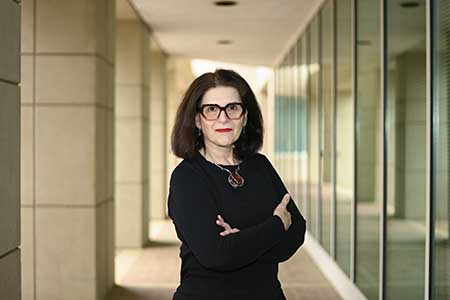Chancellor’s Professor Roslyn Mickelson elected to National Academy of Education

UNC Charlotte Chancellor’s Professor Roslyn Arlin Mickelson is one of 18 exceptional education leaders and scholars elected as members of the National Academy of Education for valuable contributions to education research and policy development.
Mickelson is widely regarded as one of the most prominent national scholars in her field. A faculty member at Charlotte since 1985, she is a professor of sociology, public policy and women’s and gender studies.
“My election to the National Academy of Education validates what I have spent 50 years doing,” Mickelson said. “I have been a teacher, and I have been a researcher studying education. I think education has all the interesting questions, and I’m still trying to find the answers.”
Mickelson’s work examines the ways that the organizational features of educational institutions interact with the race, ethnicity, gender and social class of students to shape educational opportunities, teaching and learning processes and K-16 student outcomes. She has presented summaries of her research to then-Secretary of Education Arne Duncan, and her findings have been cited in U.S. Supreme Court opinions.
“Education has the promise for transformation,” she said. “It’s very important to conduct scientific research about the institution of education because of its intimate relationship with the economy, with citizenship, with science, with human rights, with individuals’ ability to reach their full potential and with society’s potential to be transformed into a more livable, fair and just place to live and work.”
Public policy in education is constantly reformulated, which means that scientific, data-informed research is essential, she stated.
“My research, and the research of these colleagues, is creating a scientific record of education’s role in reaching goals,” she said. “People who wish to base their forming of policy on the scientific record will have information available.”
Mickelson’s research confronts the dual tendencies of education and the factors that influence both.
“One tendency is transformation toward desirable outcomes,” she said. “The other tendency is reproduction of inequalities and unfairness that can plague the lives of people and societies.”
The impact of education occurs on two levels, her research shows. “A person can be transformed by their own education, while the rest of society is stagnant or returning to a less desirable state,” she said Mickelson. “Similarly, an individual person may be stuck in their situation or circumstances while society becomes more equal, more fair, more just, more healthy.”
Currently, Mickelson and colleagues are examining the individual characteristics, family background and school organizational factors that affect college students’ success in attaining STEM degrees. With colleagues in the College of Computing and Informatics, she is part of the I-PASS Project to increase the enrollment and graduation rates of students from underrepresented populations within the college, with support from the National Science Foundation. Additionally, she is writing a book that will draw from research of the past decade.
“I’ve been at UNC Charlotte a long time,” Mickelson said. “I’ve seen the enormous changes in this University. I myself have changed. But I’m still pursuing those questions that my nine years as a public high school teacher in Southern California raised for me. The University has given me the opportunity to spend my work life doing what I love, and I appreciate that. I am going to continue until it’s no longer fun. It’s still fun, and it’s still satisfying.”